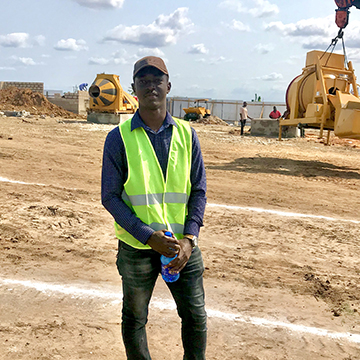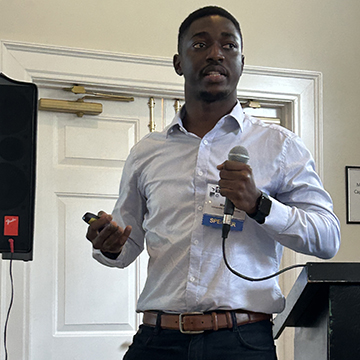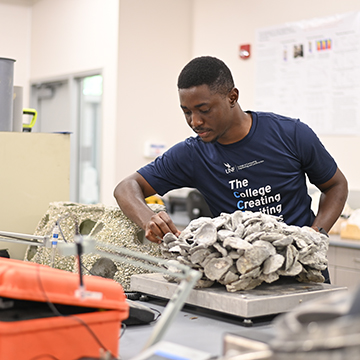UNF graduate student preserving coastlines from the Atlantic to the Indian oceans
 Growing up in the Dar es Salaam region of Tanzania near the beautiful Indian Ocean, Makaya Malila spent many hours of his youth enjoying the sunshine, picturesque beaches and warm weather.
Growing up in the Dar es Salaam region of Tanzania near the beautiful Indian Ocean, Makaya Malila spent many hours of his youth enjoying the sunshine, picturesque beaches and warm weather.
Beyond enjoying the natural beauty, he watched enormous economic growth in Tanzania, which according to the World Bank, formally graduated from low-income to lower-middle-income country status in July 2020.
Malila dreamed of studying science and engineering to help his country continue to expand and progress while also protecting the natural resources among rising global climate threats.
He has been conducting some of that research as a graduate student for the last two years at the University of North Florida, where he will earn his master’s degree in civil engineering this summer.
A growing vision
In 2019, he completed his undergraduate degree in civil engineering, graduating among the top in his class at the University of Dar es Salaam, the most prestigious and largest public university in Tanzania.
 Malila worked for three and a half years after graduation overseeing multiple public and private construction and design projects, which made him eligible to earn his professional engineer license.
Malila worked for three and a half years after graduation overseeing multiple public and private construction and design projects, which made him eligible to earn his professional engineer license.
“It’s an incredible thing to help design, build and see your vision grow, and to watch your small country develop,” said Malila.
He applied to UNF in 2022 and was accepted into the Master of Science in Civil Engineering program.
Malila remembers the painful chilly air hitting his lungs after he first landed at the Jacksonville airport during December after an exhausting 40-hour flight.
“Coming to UNF was my first time traveling abroad and it was a big jump from everything I was used to,” said Malila. “I knew Jacksonville was a coastal port city like Dar es Salaam, but the climates are very different.”
At UNF, Malila jumped into research and getting to know other students. He joined the American Society of Civil Engineers, National Society of Black Engineers and the American Concrete Institute and actively participates in numerous professional networking events.
“I had major culture shock for months as I got used to this massive city, colder weather, people from so many different cultures and accents,” he said. “Swahili is my first language and we learned English in school, but it didn’t prepare me very well for the Florida dialect.”
A dedicated researcher
His research interests were sparked during his undergraduate years in Tanzania, where he focused on concrete admixtures. Upon his arrival at UNF, he started working with Dr. Raf Crowley, civil engineering professor, and the UNF Taylor Engineering Research Institute on coastal resilience projects using living shoreline structures, Pervious Oyster Shell Habitats (POSH) units and Reef Balls. This innovative POSH unit restoration project was created, built and studied over the last few years at UNF. The units provide a promising option for oyster reef restoration in energetic estuarine systems, creating an environmentally friendly and effective solution for enhancing oyster habitat and shoreline stabilization.
 Malila assisted in modelling, building and testing the POSH units and presenting findings. The second year of findings from the POSH project are awaiting publication and were presented by Crowley at the Geo-Congress Conference event in Vancouver, Canada, earlier this year.
Malila assisted in modelling, building and testing the POSH units and presenting findings. The second year of findings from the POSH project are awaiting publication and were presented by Crowley at the Geo-Congress Conference event in Vancouver, Canada, earlier this year.
Malila also conducted research on computational fluid dynamics testing, field erosion studies done by surveying using LiDAR and drones, field observations and wave data measurements using acoustic doppler current profilers (ADCP), and research on concrete admixtures.
He is currently working on a project that would allow scientists to measure erosion and sediment movement in coastal areas using the iPhone’s Lidar sensor instead of expensive equipment such as drones or airplanes.
“Makaya is an incredibly dedicated researcher and one of the best and brightest there is,” said Crowley. “He will be successful in any of his future endeavors.”
Malila is considering pursuing a PhD program to continue his research efforts after graduating from UNF. He plans to eventually return to Tanzania with the knowledge he has gained at UNF and contribute to build, preserve and protect his home country.
“I hope my research will contribute beyond Jacksonville and Dar es Salaam and make an impact on global knowledge about coastal engineering,” said Malila. “We must protect our environment and make sustainable progress globally to have a better future for everyone.”
